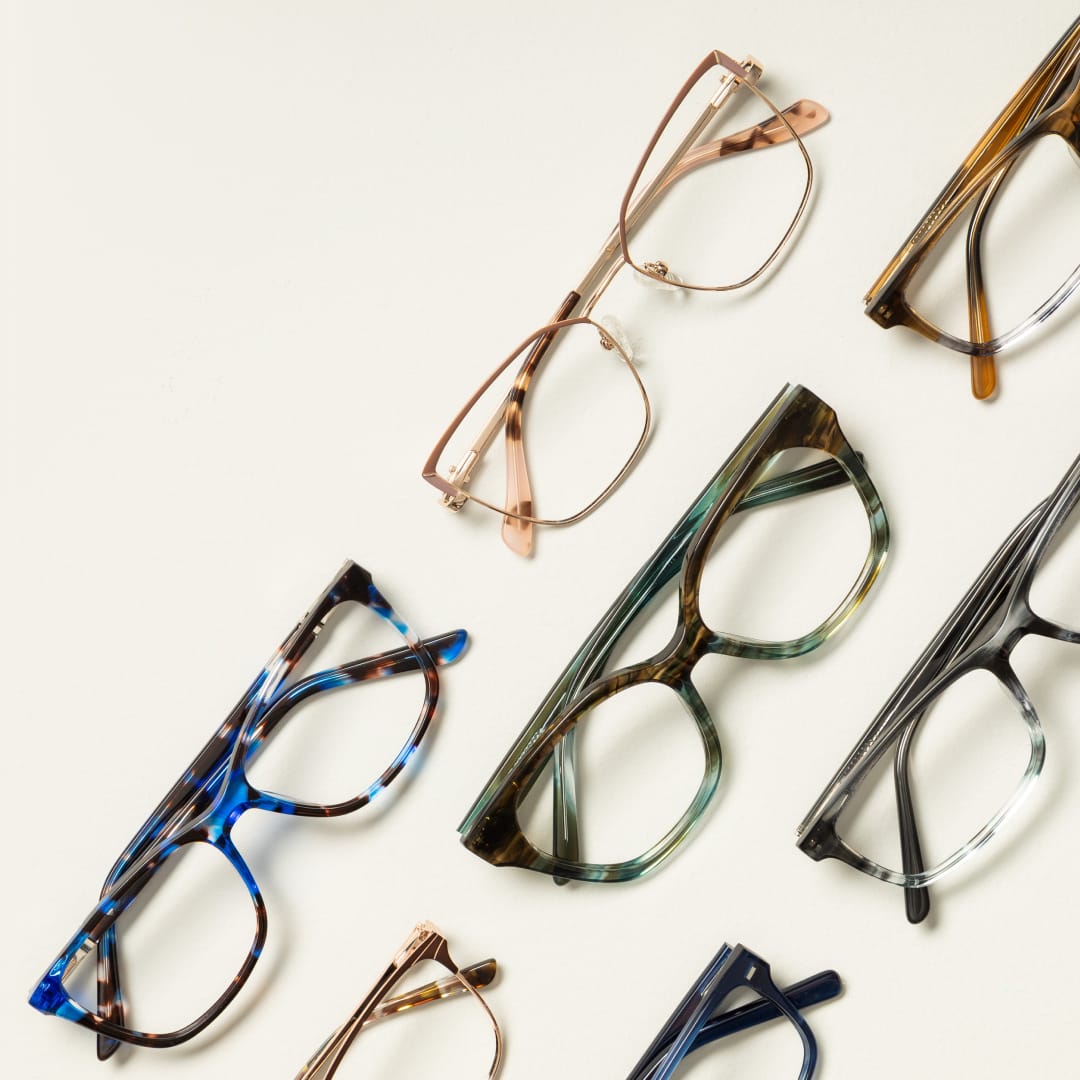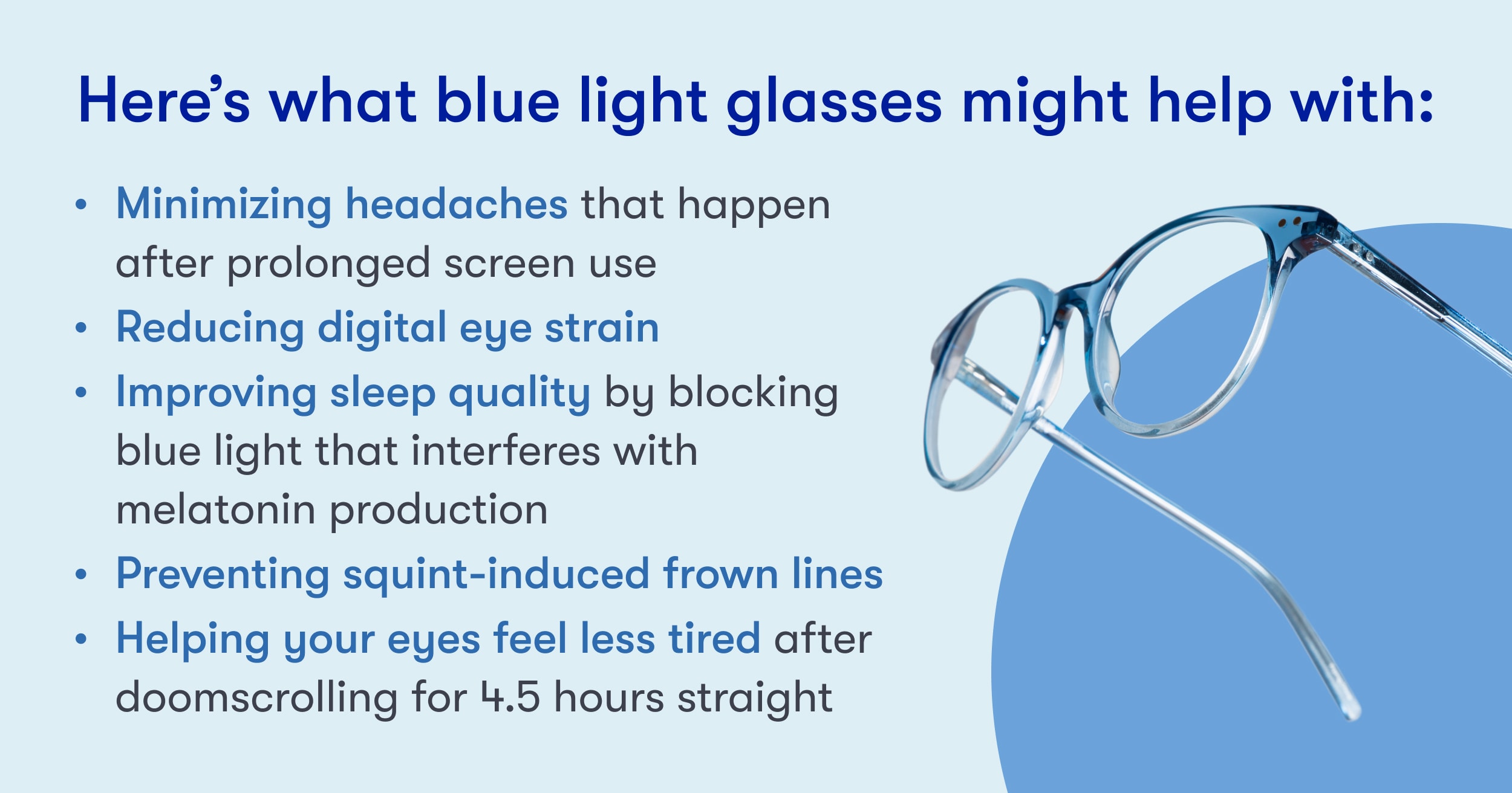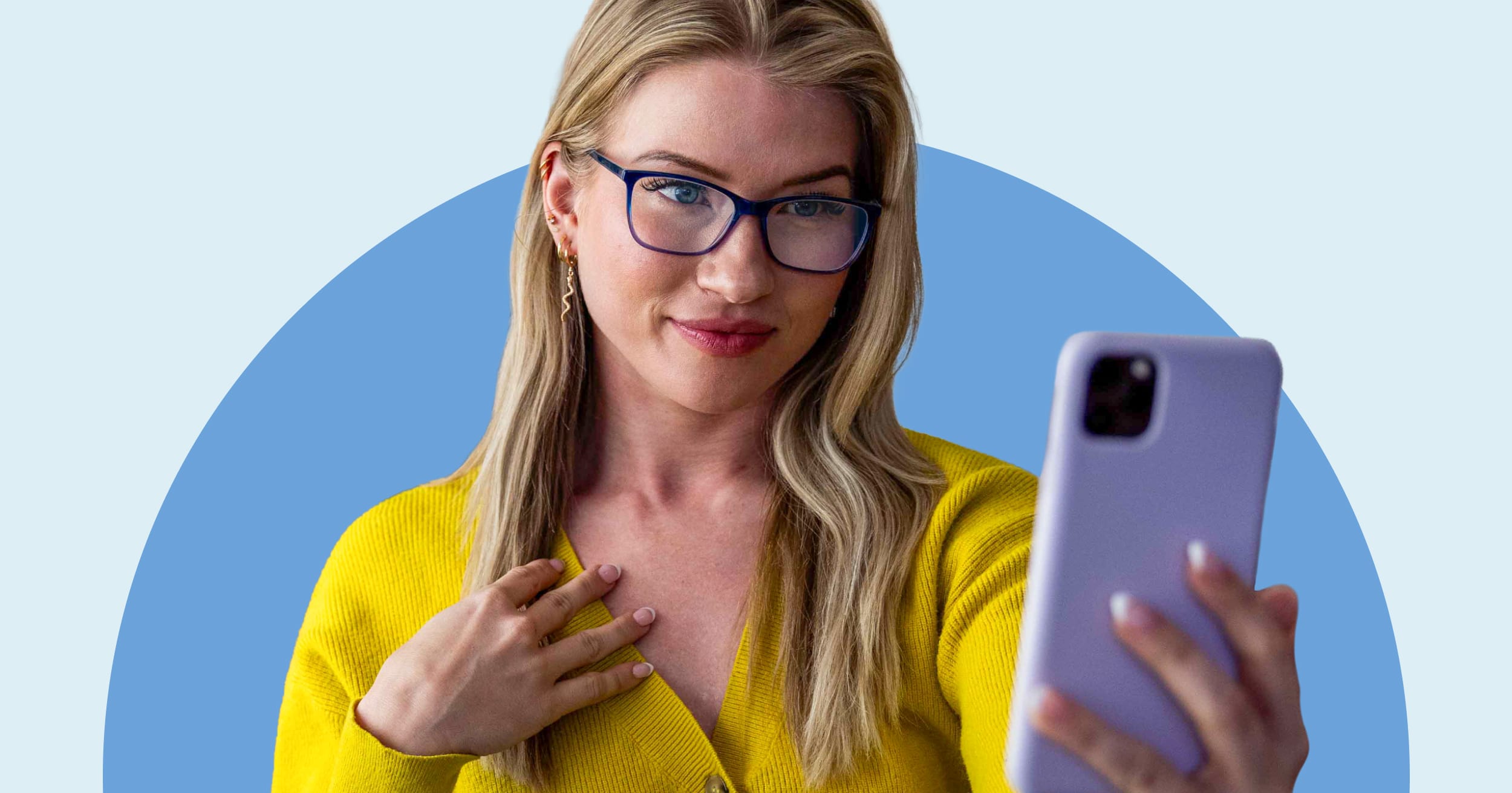What are blue light glasses, and do you need them?
Blue light glasses (sometimes called blue light blocking glasses, computer glasses, or the only thing standing between you and a tension headache) are specially designed eyewear that filter or block blue light emitted from digital screens.
They come in two types:
-
Blue light filtering lenses use a subtle coating to absorb some of the higher-energy blue wavelengths — enough to take the edge off screen time while keeping your color perception mostly intact.
-
Blue light blocking lenses are stronger, often with a yellow or amber tint that blocks a higher percentage of blue light (and makes your screen look like it’s permanently set to cozy campfire mode).
So, why were they invented? Well, welcome to modern life: Humans now spend 7+ hours a day staring directly into glowing rectangles. The issue is that blue light (a high-energy visible light) scatters more than other wavelengths, which can make focusing harder, potentially disrupt your sleep by suppressing melatonin, and contribute to digital eye strain and fatigue.
Blue light is all around us — sunlight, LED bulbs, phones, laptops, tablets, TVs, smartwatches, and probably your fridge. Blue light glasses were created to help our eyes survive in that 24/7 glow.
Do they actually work, and where can you get a pair that won’t make you look like you’re starring in a daytime crime procedural?
Let’s get into it — screens, strain, science, skepticism, and stylish solutions. Your eyeballs are in good hands. 
The Framery at 1-800 Contacts
Get premium frames starting at $79
Shop glasses
Are blue light glasses effective?
There isn’t yet a massive body of research proving that blue light glasses are effective. Most clinical studies are still catching up with our screen-heavy lifestyle, and the science around blue light exposure and long-term eye health is, let’s just say, developing its character arc.
That said, many wearers (and some eye care professionals) report real benefits, especially when it comes to daily comfort. So, while we can’t call them miracle goggles just yet, we can say they’ve earned their place on the desk — right next to your iced coffee, photos of loved ones, speakers, and vague sense of existential dread.
Here’s what blue light glasses might help with:
-
Minimizing headaches that happen after prolonged screen use
-
Reducing digital eye strain
-
Improving sleep quality by blocking blue light that interferes with melatonin production
-
Preventing squint-induced frown lines (not medically proven, but spiritually relevant)
-
Helping your eyes feel less tired after doomscrolling for 4.5 hours straight
Now, let’s break down those benefits a bit more.

Do blue light glasses help with headaches?
There isn’t yet enough hard evidence to say that blue light glasses definitely prevent or reduce headaches. But plenty of people who wear them say their screen-related headaches are less intense — or disappear altogether — when they use them consistently.
Here’s the logic: Extended screen use can lead to something called digital eye strain (aka computer vision syndrome). This condition includes symptoms like eye discomfort, blurry vision, and (you guessed it) headaches. Blue light may not be the only culprit, but it’s often part of the mix.
What’s really behind those screen-induced headaches?
-
Blue light exposure, which may disrupt your brain’s internal lighting schedule (your circadian rhythm, if you want to impress your friends)
-
Unblinking focus, which reduces tear production and dries out your eyes (the I-forgot-I-had-eyeballs effect)
-
Poor posture, screen glare, bad lighting, and the fact that your desk chair is somehow both too soft and too hard
-
Long stretches of screen time without breaks, hydration, or a single meaningful eye movement beyond your screen since 9 a.m.
So, do blue light glasses help with headaches? For some people, yes. For others, the relief might come more from being reminded to take breaks and blink occasionally. Either way, your brain wins.
Do blue light glasses help with eye strain?
This one’s a little clearer (ironically). Many people do report less eye fatigue after wearing blue light glasses, especially during long stretches of screen time. That includes fewer dry eyes, less blinking fatigue, and reduced general discomfort.
Like with headaches, the research is still catching up. But here’s what (we think) we know:
-
Blue light has a higher energy frequency, which can scatter more easily and create visual noise. That noise makes your eyes work harder to focus — especially in low light or on backlit screens.
-
Wearing blue light glasses can help filter some of that harsh light, which may reduce how hard your eyes have to work to keep things crisp and focused.
-
Less squinting means less strain and more capacity to finish your tasks without turning into a sea creature made of eye rubs and regret.
-
Blue light filtering may support more relaxed eye movement, which can reduce the feeling of tension behind your eyes after hours of scrolling.
-
Wearing glasses with the right lens coating can cut down on contrast flicker, which may otherwise keep your eyes in a low-grade state of visual turmoil.
Blue light glasses aren't a cure-all — but they can be a comfort booster. And honestly, when you’ve got 47 open tabs and a deadline shaped like a freight train, every little bit helps.
What is the 20-20-20 rule?
Even if you’re not ready to commit to blue light glasses, this rule is your new best friend. It’s simple, science-backed, and designed to keep your eyes from staging a full-blown protest.
Here’s how it works:
-
Every 20 minutes, look at something 20 feet away for 20 seconds.
That’s it. That’s the whole rule. It gives your eyes a break from the near-focus stress of screen work and helps relax the muscles responsible for all that up-close precision. (They’re tiny muscles. They’re tired. Be kind.)
Blue light may be one piece of the eye strain puzzle, but other factors — like screen brightness, blink rate, screen distance, and your posture — also contribute to discomfort. Following the 20-20-20 rule helps across the board.
Whether you’re Team Glasses or Team Squint-and-Hope-for-the-Best, the 20-20-20 rule is a no-cost way to protect your vision and feel a little more human by 5 p.m.
Can you get blue light glasses with your prescription?
Yes, you absolutely can — and probably should, if you’re a regular glasses wearer who also has regular access to the internet.
Many people opt for prescription lenses with built-in blue light filtering, which means you don’t have to switch between your everyday specs and your screen-friendly pair. It’s all baked in. Like lasagna. But for your eyeballs.
Need a prescription? You can take an online vision exam to renew yours quickly and comfortably (read: while wearing sweatpants). Then, once you’ve got your updated details, you can shop for blue light glasses just like you would with any regular prescription.
Still deciding between glasses and contacts? Here’s a handy guide to help you choose what’s right for you.
Can people tell you're wearing blue light glasses?
Sometimes — but it depends on the lenses, the lighting, and how observant the people around you are.
Some blue light glasses have a faint yellow or amber tint that’s only noticeable if someone’s staring directly into your soul. Others are virtually invisible, using a special clear coating that filters blue light without changing how things look.
That said, in certain lighting, blue light lenses might reflect a subtle blue or purple glare (aka the "Please allow me to introduce myself. I'm a person of eye health and taste" shine). If you’re worried about the aesthetic, you can always opt for anti-reflective coatings or frames that turn attention to your fashion sense and away from the science project happening on your face.

Where to buy blue light glasses
You can find blue light glasses pretty much anywhere you’d shop for regular ones — online, in-person, in pop-ups, or from your friend who suddenly started a DTC eyewear brand. Look for:
-
The right level of tint or filtering. Clear lenses are subtler, while amber lenses are stronger.
-
A comfortable frame fit. If they pinch, slide, or make you feel like you’re being slowly reshaped, you won’t wear them.
-
Options that match your lifestyle. If you’re already wearing prescription lenses, you can add blue light filtering right to those. Or try a site like The Framery to explore styles that don’t make you feel like an off-brand sci-fi professor.
Ultimately, the best pair is the one you’ll actually wear. Bonus points if the glasses don't cost a ton and actually block glare.
Blue light protection meets prescription ease
Blue light doesn’t care what time it is, but your eyes definitely do. After hours of working, scrolling, clicking, and pretending you're not squinting, they deserve a break — and maybe a little protection. Blue light glasses won’t fight crime, but they might help you make it through your next workday.
Need them with your prescription? Easy. Take a quick online vision exam, get your details sorted, and shop without leaving your digital fortress
Did you know you can order contacts online?
Say goodbye to trips to the eye doctor and hello to convenience! With 1-800 Contacts, you can easily order your contact lenses online and have them delivered straight to your door. Plus, our online vision exam makes it simple to get the prescription you need without leaving home. And the best part? You’ll save money on your first order with 1-800 Contacts. It’s never been easier to get your contacts!

The Framery at 1-800 Contacts
Get premium frames starting at $79
Shop glasses
FAQs
Can blue light glasses improve sleep?
They might! Blue light — especially from screens — might mess with melatonin, the hormone that tells your body it’s bedtime. Wearing blue light glasses in the evening could help your brain start winding down like it’s supposed to (instead of assuming it’s high noon in a stadium full of ring lights).
Do you need a prescription to buy blue light glasses?
Nope. You can get non-prescription blue light glasses off the shelf — or order them online — just like sunglasses. But if you do need vision correction, you’ll want to combine both into one glorious pair of multi-talented lenses.
Are blue light glasses just a trend?
They’re trendy, yes. But they’re not just a trend. They’re a response to real-life screen overload — and even if the science isn’t settled, the comfort benefits are enough for many people to keep wearing them (and keep buying them)...





